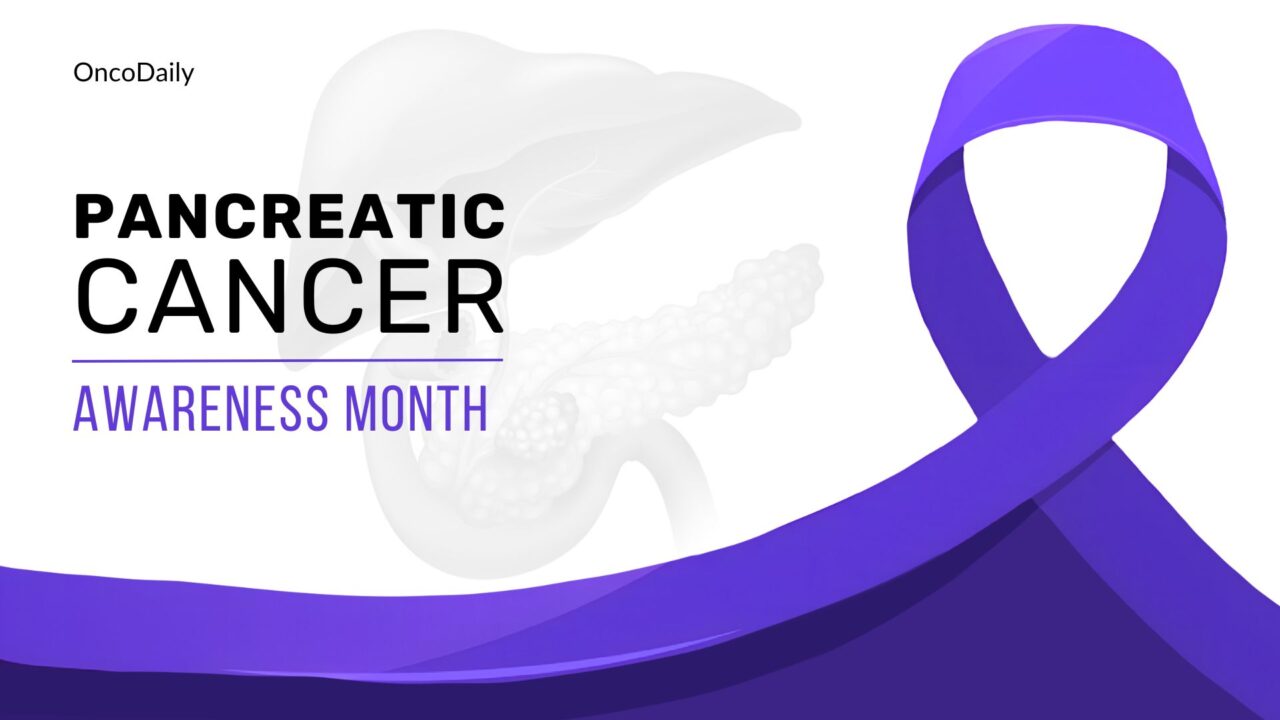November is Pancreatic Cancer Awareness Month – A Time to Raise Awareness, Advocate for Change, and Strive for Improved Treatment and Survival Rates.
Pancreatic Cancer Awareness Month is observed every November. During this month, organizations and advocates focus on raising awareness about pancreatic cancer, which is one of the most aggressive and difficult-to-diagnose cancers. The goal is to increase understanding of the disease, promote early detection efforts, and highlight the importance of research funding for better treatment and prevention.
Pancreatic cancer is one of the most lethal and aggressive forms of cancer. It is the 12th most common cancer worldwide, with over 495,000 new cases diagnosed in 2020. The high mortality rate is also attributed to the late diagnosis of the disease, as pancreatic cancer often remains asymptomatic until it reaches an advanced stage.
What Are the Symptoms of Pancreatic Cancer?
Common symptoms of pancreatic cancer include jaundice, abdominal pain, unexplained weight loss, and digestive issues. Jaundice, seen in about 70% of cases, results from a blocked bile duct. Abdominal pain, often radiating to the back, is another frequent symptom. Patients also experience weight loss and digestive problems like nausea or poor appetite. For instance, many patients report unexplained fatigue and weight loss, which are common early signs. Studies show that 60-80% of patients present with these symptoms, underscoring their prevalence in pancreatic cancer.
What Are the Causes and Risk Factors for Pancreatic Cancer?
The risk factors for pancreatic cancer are influenced by both genetic predisposition and environmental factors. Research from Siegel et al., 2023, highlights that family history and inherited mutations, such as BRCA1/BRCA2, are significant genetic contributors to the disease. Lifestyle factors also play a pivotal role; smoking, according to a 2021 study by Ilic and Ilic, doubles to triples the risk of pancreatic cancer, accounting for approximately 20-30% of cases.
Discussions and posts highlighting Pancreatic Cancer Awareness Month:
Pancreatic Cancer Action Network:
“Every time Miss America, Madison Marsh, puts on her storied crown, she carries the spirit of her mom, Whitney, with her.
Whitney passed from pancreatic cancer in 2018, when Madison was just 17 years old. Now, as Miss America, Madison has dedicated her time in the spotlight to honoring her mom and raising awareness about this disease.
To Madison, her mom was everything a child could hope for: Loving, uplifting, kind. She was also active and athletic, so a pancreatic cancer diagnosis took her family by surprise.
Madison has said that her mom experienced symptoms at least two years before her diagnosis – but that they were misdiagnosed. Unfortunately, this happens far too often when it comes to pancreatic cancer, since common symptoms like unexplained weight loss, back pain and changes in stool could be attributed to any number of other issues.
Now, Madison is using her platform to spread the word about the signs and symptoms of pancreatic cancer, urging both awareness and self-advocacy.
“Take your health seriously. You know your body best. When you go to the doctor and you know something’s wrong, advocate for yourself. Go get a second opinion.” – she says
During Pancreatic Cancer Awareness Month, she encourages “Everything that we do in the pancreatic cancer space matters. Every time you show up to a walk, you donate, you share something from PanCAN about pancreatic cancer, that is making a difference and could save a life. It is the small things that are going to have this giant ripple effect to save people.”
Read Madison’s story.”

“Today marks the beginning of Pancreatic Cancer Awareness Month and this year, we are calling attention to the burgeoning global crisis that is pancreatic cancer. Every day I speak to more and more people who have been impacted by this devastating cancer. And it’s no surprise. This cancer is spreading and on a trajectory to become the second deadliest cancer by 2030. The five-year survival rate averages only 10% percent meaning 90% will die from the disease and 70% will die within the first year. Most alarmingly, the demographic that is being increasingly impacted is women under the age of 55.
We have long said that ‘enough is enough’ and that call is now the most urgent it has ever been. We need to do more.
At Pancreatic Cancer Canada, more means …raising funds to increase our investments in early detection and harnessing the power of AI to accelerate progress, identifying novel approaches to pain management, deepening our supportive care for those on this excruciating journey and raising awareness so that the general public and members of the health care community are aware of the signs and symptoms and the shifting demographics. All areas we believe are critical to fundamentally changing how people experience this cancer – as patients, caregivers and loved ones.
I invite you to share this post. It takes an uprising for this or any kind of change. We have done it for other cancers, we can do it for this one. To learn more, please click on the post below.”
“It’s Pancreatic Cancer Awareness Month and PanCAN is raising awareness about the importance of early detection. Know the risk factors and symptoms and be your own best health advocate- it can save your life. Learn more.”

“November is Pancreatic Cancer Awareness Month!
While exploring articles on this vital topic, I came across a fascinating piece from the Mayo Clinic discussing advancements in eliminating pancreatic cancer through total robotic Whipple surgery. As a huge Grey’s Anatomy fan, the mention of ‘Whipple’ instantly reminded me of Dr. Burke, Bailey, and the OR!
This sparked my curiosity and prompted me to dive deeper into the article and led me to reading more about the Whipple Surgery. I was truly amazed by the incredible integration of automation in the medical field⚕
Traditionally, Whipple surgery is a complex and labor-intensive procedure, but now it can be performed robotically, enhancing precision and potentially improving patient outcomes.
Additionally, I discovered that purple is the official color for pancreatic cancer awareness! It symbolizes hope and the ongoing fight against this challenging disease.
Let’s raise awareness, support innovative solutions in medicine, and honor those affected by pancreatic cancer!”
“Pancreatic cancer is one of the deadliest types of cancer, affecting millions of families around the world—including Miss America’s and mine. Take a moment this World Pancreatic Cancer Day to learn the symptoms and assess your risk: it might just save your life or others.”

“November is Pancreatic Cancer Month. November 21st was a World Pancreatic Cancer Day. A day to raise awareness about Pancreatic Cancer, support those affected and promote research for better treatment options and earlier diagnosis.
World Pancreatic Cancer Day is also an opportunity to reflect on the progress made, the challenges ahead and the power of community in battling this relentless disease.
To learn more about world pancreatic cancer day and its’ history, check this blog.”
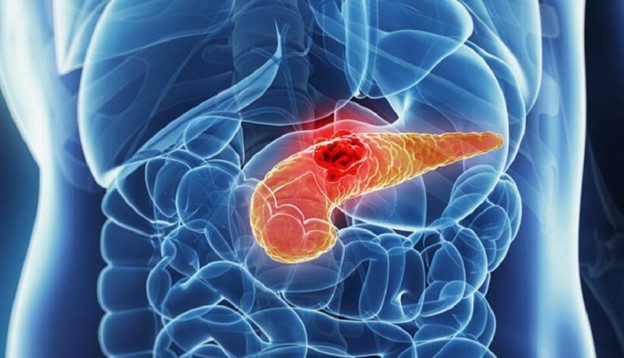
“November is Pancreatic Cancer Awareness Month! To mark the beginning of the month, we created an AI-generated avatar to raise awareness and explain why TriCan Health exists. Despite feeling strange about seeing my ‘digital twin’ I am excited to share how TriCan is working to help cancer patients find clinical trials and access the advanced medicine of tomorrow, today.”
“November is Pancreatic Cancer awareness month. Did you know…
More than 50% of people diagnosed with pancreatic cancer die within 3 months. These survival rates are among the lowest for common cancers, with 5-year survival rates of less than 8% and 10-year survival rates of only 5%.
Unlike other cancers, these survival rates have remained largely unchanged for the past 50 years. Despite the shockingly low survival rates and it being the 5th biggest cancer killer, only 3% of the UK cancer research budget goes to pancreatic cancer.
No screening is currently available in the UK. However, for those with a family history of pancreatic cancer who may be at higher risk, monitoring could be possible through the EUROPAC study. I have registered onto the study and highly recommend considering it if you’re eligible.
You can find out if you might be at a higher risk of developing pancreatic cancer using Pancreatic Cancer UK’s Family History Checker here.
Early diagnosis remains key to improving survival rates.
For more information, please see Pancreatic Cancer UK and Pancreatic Cancer Action.”
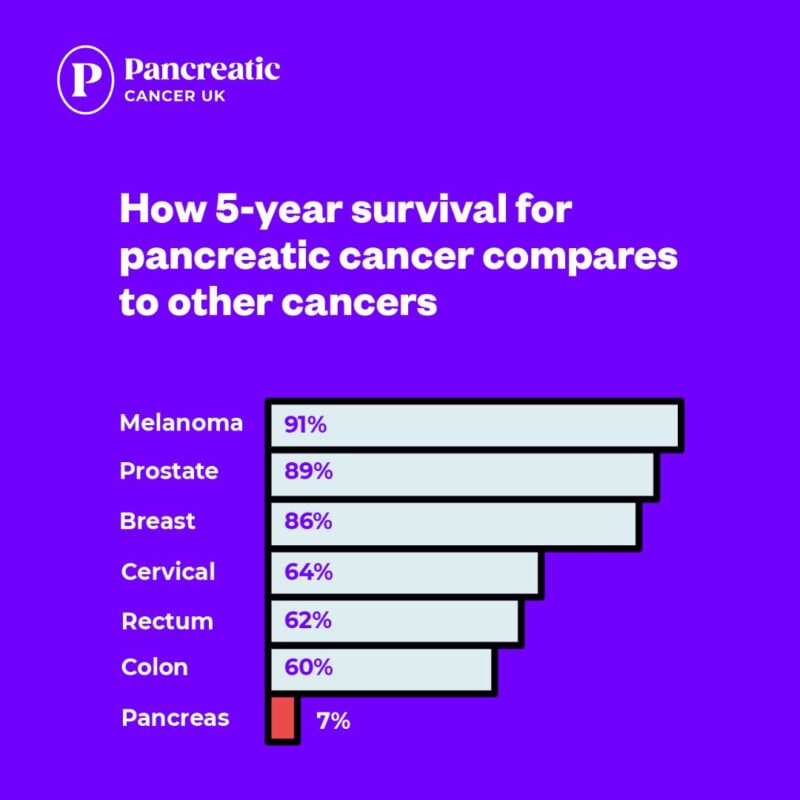
“I want to share some facts with you you probably wont be aware of them unless you have been affected by the disease.
I was the same until 2014 when my curious, kind wonderful loving husband Seth was diagnosed with late stage pancreatic cancer, he died 33 short and heartbreaking days later.
Please share the facts below and infographics to help raise awareness as November is pancreatic cancer awareness month.
Pancreatic cancer is 5th biggest cancer killer in the UK with 9,558 deaths per year between 2017 and 2019.
Pancreatic cancer has the lowest survival of all common cancers, with five-year survival less than 7%.
Five-year survival of pancreatic cancer in the UK lags behind the rest of the world, with the UK ranking 29th out of 33 countries with comparable data in CONCORD-3
Early diagnosis is crucial to improve survival outcomes for people with pancreatic cancer; with one-year survival in those diagnosed at an early stage six times higher than one-year survival in those diagnosed at stage four. However, most people with pancreatic cancer are diagnosed at a late stage.
1 in 5 people with pancreatic cancer are diagnosed at stage one and stage two.
80% (4 in 5) are diagnosed at stage three and stage four.
1 in 2 people are diagnosed with pancreatic cancer via an emergency, such as A&E
Surgery is the only treatment with curative intent for pancreatic cancer while chemotherapy and radiotherapy have also been shown to improve survival in late stage pancreatic cancer. However, most people with pancreatic cancer will receive no active treatment (including surgery, chemotherapy or radiotherapy).
7 in 10 people with pancreatic cancer do not receive any active treatment.
1 in 10 people with pancreatic cancer will receive potentially curative surgery.
2 in 10 people will receive chemotherapy.
Source Pancreatic Cancer UK.”
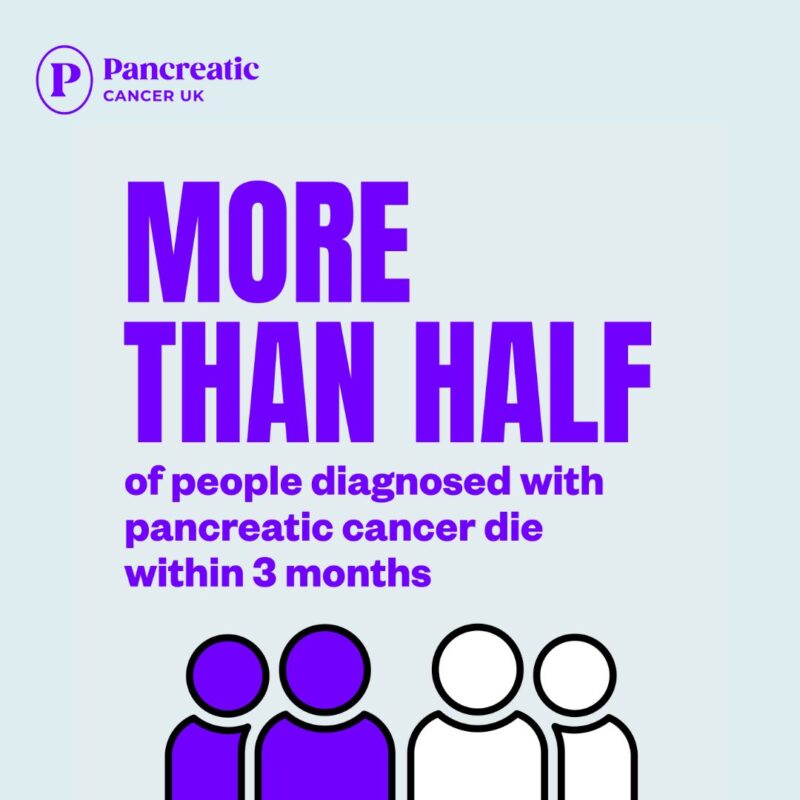
“November is Pancreatic Cancer Awareness Month.
Early detection is key and can change the course of this disease. Today, there is no standard test like a mammogram or colonoscopy to find pancreatic cancer early, but early detection is critical to increasing survival.
Know the signs and symptoms, know your risk, and know your family history — it can save your or someone you love’s life.”
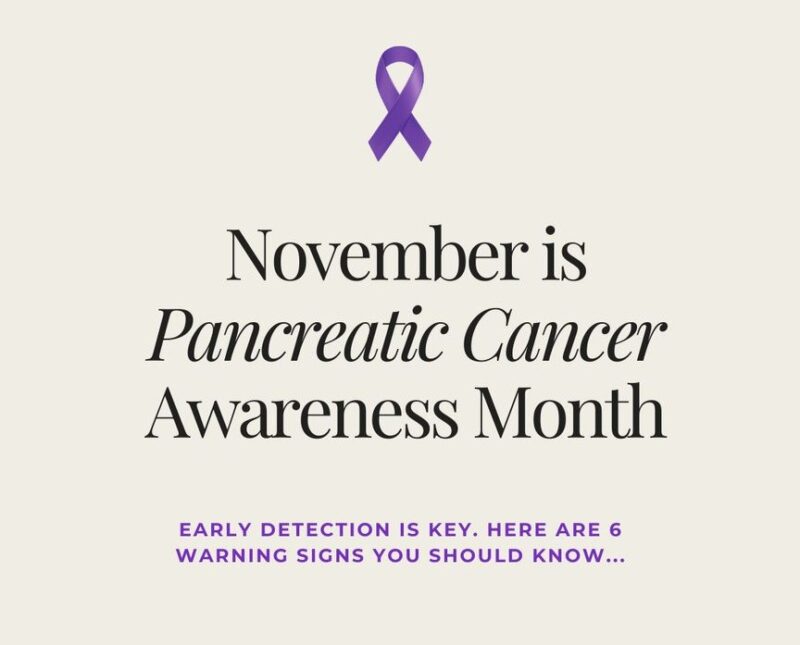
The Princess Margaret Cancer Foundation:
“Dan Murphy had no symptoms. Out of nowhere, his doctor found a mass on his pancreas in late April 2023. A few months later, in June, Dan received a shocking diagnosis: stage 4 pancreatic cancer that had spread to his liver.
“It was devastating. It felt like the wind was knocked out of me. I knew enough to understand that this was really, really bad news,” he said.
Dan never expected to get this diagnosis. He wasn’t aware of his genetic predisposition to pancreatic cancer before his diagnosis. Although the prognosis seemed grim, his family remained positive and hopeful.
“We decided very quickly that we weren’t going to frame this as a fight against cancer, but as living with it,” Dan said and explained how his diagnosis altered his life. “I don’t sweat the small stuff as much as I used to. It helped me realign my priorities.”
November is Pancreatic Cancer Awareness Month and Dan’s inspirational story illustrates how silent pancreatic cancer can be — but there’s still hope.
The Princess Margaret is on a mission to enhance awareness, early detection, and testing. Will you help us spread the word and support life-saving cancer research?”
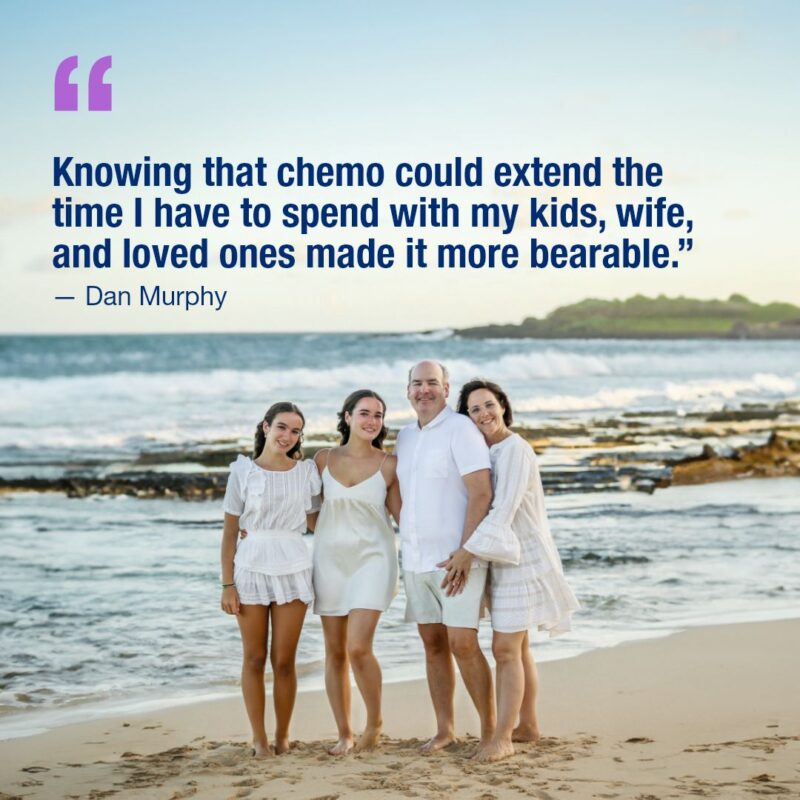
“Last year I lost my father-in-law, John, to Pancreatic Cancer. He lived for only 6 short weeks from diagnosis. 6 weeks.
November is Pancreatic Cancer Awareness Month.
So much more needs to be done to raise awareness and improve early detection techniques to save lives in the future. Survival rates for Pancreatic Cancer are only 5%, making it the worst of the top 25 most common cancers, and sadly these rates have not improved much in the past 50 years.
The symptoms of pancreatic cancer are vague, making it incredibly difficult for GPs to distinguish it from other less serious conditions. As a result, most people with pancreatic cancer are diagnosed too late. Too late for treatment, too late to survive. Please, please, please if you have any of these symptoms go to the GP!
– Indigestion
– Pain in your tummy or back
– Changes to your poo
– Losing weight without meaning to
– Jaundice
There is hope, and with more funding Pancreatic Cancer UK aims to develop new tools, including a simple breath test, to improve the detection so more people are diagnosed earlier, giving them the chance to have life-saving treatment, and saving thousands of lives every year.
Spolier I will be running the London marathon next year so get your wallet ready if you want to help!
Thanks for reading!”
“November is Pancreatic Cancer Awareness Month.
Pancreatic cancer is the deadliest common cancer. More than half of people die within three months of diagnosis. With research underfunded and left behind, people are left with only hope to hang on to.
Survival for pancreatic cancer has barely improved in the last 50 years.
In the UK, pancreatic cancer receives just 3% of the total research budget. As a result, it’s still too difficult to diagnose and treat.
And diagnosis often comes too late. That’s because symptoms are vague and may not appear until the disease is at an advanced stage. People often see their doctor several times before they are finally referred for tests, which means they experience unnecessary delays in diagnosis and wait too long for treatment to start.
There are also too few effective treatment options for pancreatic cancer. Many people are simply too unwell when diagnosed to start treatment at all.
I lost my mum to this awful disease because it was too late, help others and raise awareness this month.”
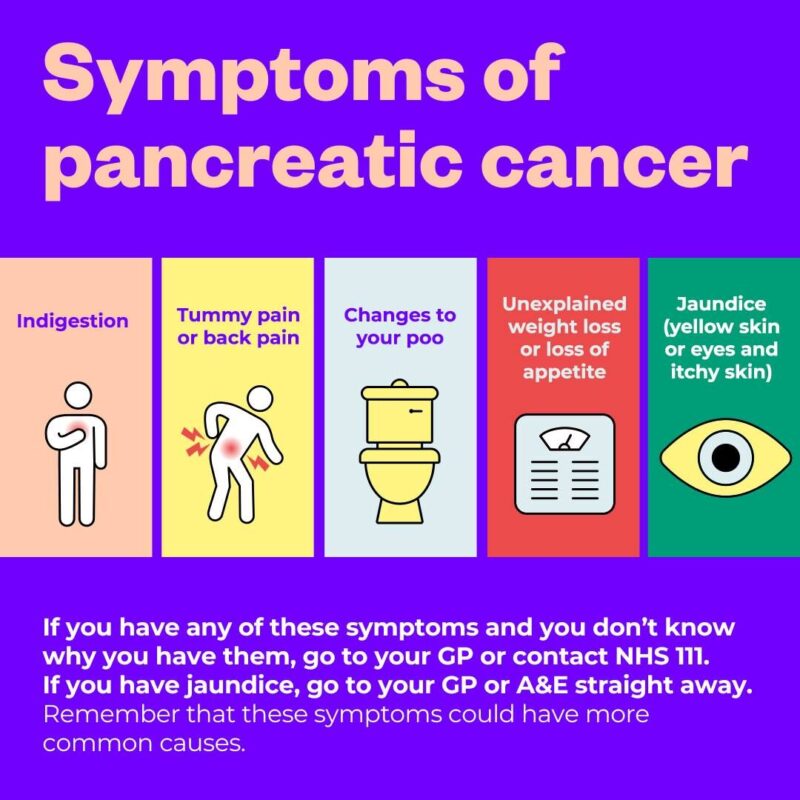
“November is National Pancreatic Cancer Awareness Month. Great to have the opportunity to discuss new approaches to early detection of pancreatic cancer at Moores Cancer Center, academic hub of the PRECEDE early detection study.”
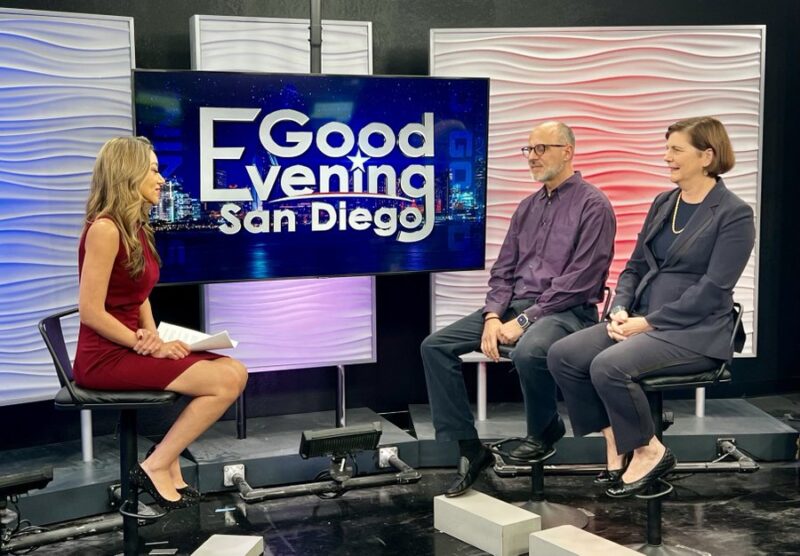
Pancreatic Cancer Action Network:
“Early detection of pancreatic cancer can save your life. This Pancreatic Cancer Awareness Month, be sure you know the warning signs of the disease and talk with your doctor if you or a loved one are experiencing one or more of these symptoms. SHARE this video with your community to spread the word.”
St. Elizabeth’s Medical Center:
“In November, we highlight the need to combat pancreatic cancer, often undetected until late stages. Early detection, awareness, and understanding symptoms and risk factors are key to better outcomes. Let’s work together to raise awareness and make a difference.”
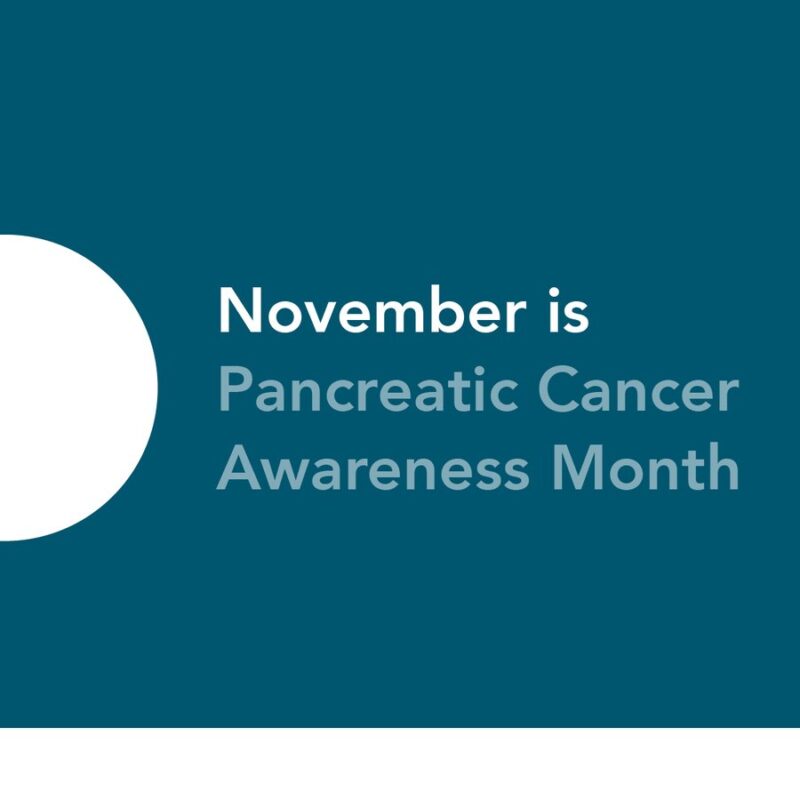
“Pancreatic Cancer Awareness Month: Eleven years ago I lost my sister to pancreatic cancer. I had a choice to let her story end there or continue to fight so that those who are still facing this disease can have a different story. I chose to do the latter, continue the fight.
The amazing thing about pancreatic cancer and cancer in general, is that it does not discriminate. It is the one equalizer between the have and have not. It is the truest look into who we are absent of what we have. A fight solely utilizing the strength which resides within each of us.
Sometimes the toughest fights in life are won after many losses. The key to victory is in persistence, perseverance and knowing your “WHY”. My why is and has always been my sister Vi and not allowing her death to be in vain. The way I do this is through my advocacy and supporting organizations like Pancreatic Cancer Action Network.
When Vi was diagnosed the survival rate was 4% and now it is 12%. This only happened because individuals refused to see what is inevitable as impossible. A CURE WILL COME.”
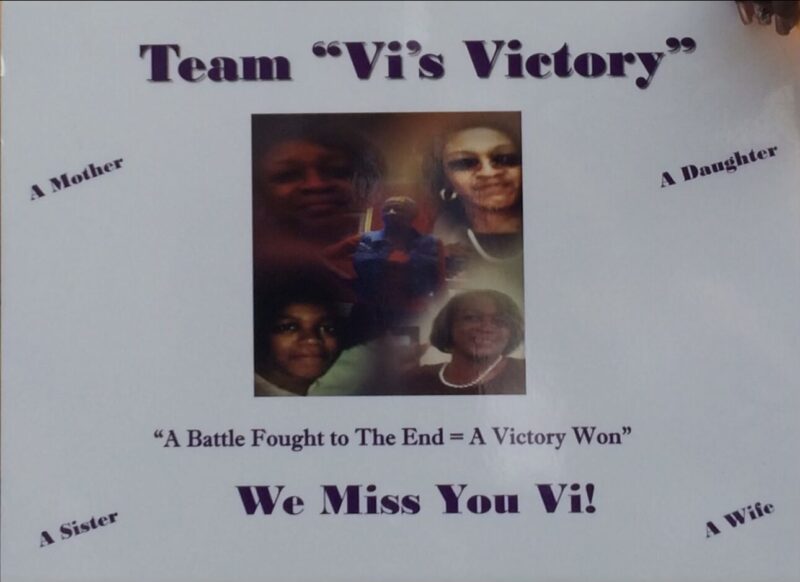
“As Pancreatic Cancer Awareness Month comes to a close, one of our dedicated researchers, David Hackett, explains why pancreatic cancer can be hard to diagnose and treat and how his research and your support will help to change that.
As David points out “this is a cancer with an extremely poor prognosis but we are moving in the right direction. Each breakthrough, big or small, brings us one step closer. Together, we can Make More Survivors”.
To read more about this, and other research we fund, visit.”
Further Reading:
Pancreatic Cancer: Symptoms, Causes, Types, Diagnosis & Treatment
Pancreatic Cancer: What patients should know about
Immunotherapy for Pancreatic Cancer


